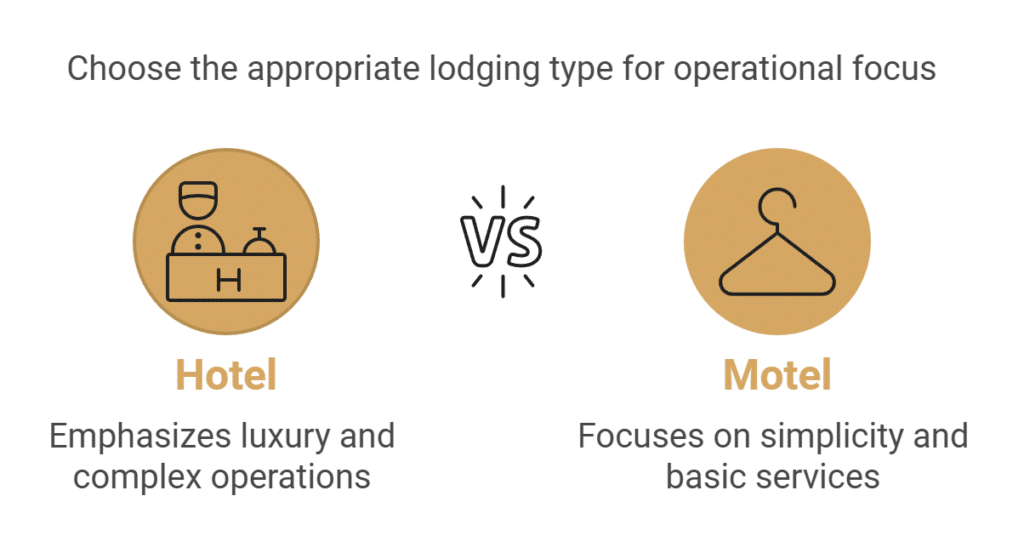Differences between a hotel and a motel are typically seen within the spheres of target demographics, their provided services, and overall design. However, you’ll also see considerable variation in these categories, ranging from utilitarian overnight services to luxury accommodation. These distinctions help to inform travelers and guide management or expansions.
In this article, you’ll discover their fundamental differences and characteristics, along with the business strategies that leverage their unique qualities.
Table of Contents:
Understanding Hotels and Motels
The differences between a hotel and a motel are multifaceted but can be broken down into two main points. A motel is a roadside property, typically focused on providing an overnight stay for drivers. Conversely, a hotel is usually multi-story and provides a wider variety of services, amenities, and options for longer visits.
For example, a hotel will usually offer spaces for business meetings, a selection of different dining services, and more aesthetic and artistic design choices. A motel is more focused on utility while a hotel expands on that idea for elaborate hospitality.
Why Understanding Hotel and Motel Differences Matters
The differences between a hotel and a motel are among the most important distinctions in hospitality, as they pave the way for successful specialization. Knowing which projects are a good fit for the motel or hotel industry can help you create a long-term business strategy. Likewise, this type of specialization means that you can more deftly meet the expectations of your guests.
When people hear the terms hotel and motel, they instantly summon up a cornucopia of expectations. Success for both guests and management stems from matching expectations to the implementation. Meet the demands of the management, and the guests will be happy. Meet the demands of the guests, and the management will be happy.
Key Differences in Hotel and Motel Operations
The differences between a hotel and a motel can be broken down into a few fundamental points. The following elements are used to differentiate them.
Video: Uncovering the Difference: Hotels vs Motels Explained
Location and Design Features
Location plays a key role in defining the differences between a hotel and a motel. Hotel marketing trends generally push for integrating popular areas and luxurious architectural design. A hotel can point to the benefits of its location while also attracting interest in its visual design. Hotels are often multi-story buildings right in the heart of a business district or travel destination.
Everything from design to security and amenities is centered around a curated guest experience. A hotel’s larger-scale design also aims to accommodate higher room rates and a more diverse demographic of guests. Hotels provide an immersive experience with specialized services, which is, in many ways, a unique destination.
Service Levels and Amenities
Hotel management typically provides round-the-clock staffing of the front desk, concierge services, and room service. The extent of the available amenities is one of the key differences between a hotel and a motel. A hotel aims for longer stays, and motels aim for shorter visits. A motel typically strives for the more utilitarian, yet still comfortable, approach.
In contrast, a hotel might offer spaces for business meetings, leisure activities, and multiple options for dining. However, the wider range of amenities also calls for extra training and specialization among staff. These differences ensure that guests can select their best option for stays. Every individual will have preferences that can fit into the models of either a hotel or a motel.
Target Market and Pricing Strategy
You can also see the differences between a hotel and a motel when looking at their pricing strategies. Marketing to hotel guests usually seeks to capitalize on people traveling for business, attendees at events, and tourists. All three types of guests are typically happy to pay more in order to receive extra amenities and the comfort those luxuries provide.
Likewise, a hotel will typically leverage its location as an additional feature. A hotel leverages all of these elements through advanced revenue management systems to set pricing based on the market, competition, services, and premium features.
Technology and Booking Systems
The hotel vs. motel comparison also extends to their respective booking systems. Hotel technology tends to link several systems together. Reservations, housekeeping, guest relationships, and food services might all be handled through a single property management system. Even more complex options like revenue optimization are often integrated into the hotel’s infrastructure.
The hotel industry’s investment in technology highlights the differences between a hotel and a motel. A hotel’s technological integration allows for guest profiling, inventory management, rate planning, and more to streamline the guest experience. Furthermore, hotels tend to aim for continual growth and investment in the underlying infrastructure.
Property Management and Maintenance
Hotel and motel distinctions often come down to the inherent complexity of a property. Hotel trends typically push for continual growth and larger properties which equates to more difficult upkeep. The difficulties apply to a hotel’s rooms, restaurants, gyms, and other public spaces.
Likewise, a hotel typically needs to put more work into preventative maintenance. Regular upkeep is typically performed on elevators, HVAC, specialized amenity systems, and safety equipment. These differences between a hotel and a motel upkeep also extend to exteriors. Hotels allocate significant resources to landscaping and other exterior elements, which boost public perception.
Staff Training and Development
Differences in hotel and motel services also extend to the staff’s training and responsibilities. Hotel staff have a more extensive training period in order to ensure consistency between every department. The hotel industry’s strategy is in part due to the inherent connections between services such as the front desk, dining, housekeeping, etc.
Hotels want guests to have a consistent experience with every member of the staff. The differences between a hotel and a motel training also extend to hotels typically performing regular assessments of the staff’s performance. Hotels also aim for a higher rate of staff retention.

Five Key Operational Strategies: Hotel vs Motel Management
Differences between a hotel and a motel also extend to business practices. The following are five major strategic differences between the two.
Video: Difference Between Hotel And Motel
1. Technology and Digital Integration
Managerial differences between a hotel and a motel are often seen in how they handle technology. Hotels are typically quick to adopt new technologies, giving them a competitive edge. This includes software suites to handle property management, check-in, CRM, revenue management, communications, and integration of smart room controls.
The systems offer significant advantages but also come back to the training issues faced by hotels. The extra training is necessitated by the differences between a hotel and a motel. Hotels need to provide staff with extra training to make use of these technologies. The training is the tradeoff for technological optimization.
2. Marketing and Distribution Channels
Differences between a hotel and a motel also create differences in how they market their services. Hotels are working with a more diverse market of potential guests and need to use a more complex multi-channel strategy.
This helps to extend their reach and maximize overall profit. Motels typically work with distribution channels which include direct booking, OTAs, partnerships with corporations, travel agencies, and direct booking. They also make heavy use of loyalty programs and all forms of digital marketing, such as social media engagement. Analytic systems can help track and hone their effectiveness.
3. Revenue Optimization Techniques
Another of the hotel-motel key differences revolves around revenue management strategies. This relates to the differences between a hotel and a motel in terms of market position. Hotels will usually leverage dynamic pricing based on continual analysis of market and competitor pricing or demand patterns.
Properties will also make use of revenue managers who can offer additional insight. Revenue managers analyze market trends, patterns in booking, and historical records to offer additional insight for allocating inventory and room optimization. Location can also influence rates, such as with accommodation in tourism or similar area-dependent elements.
4. Guest Experience Management
Guest expectation also plays a significant role in the differences between a hotel and a motel. Both aim to meet a customer’s expectations. For hotels, this means putting emphasis on amenities and more personalized service. In return, the hotel expects guests to be willing to pay more for these elements.
However, it requires a lot of work for both parties to understand exactly what’s expected. As such, hotels typically use forms of guest feedback. This information can help inform the services provided to returning guests while also showing hotels what services need improvement.
5. Sustainability and Cost Management
Sustainability, in the context of hotel-motel key differences, will have considerable variability based on the size of a property and market. However, hotels typically put an emphasis on some elements of sustainability related to waste reduction and energy efficiency. This is often accomplished by tracking metrics related to resource utilization and then identifying options for optimization.
Scheduled audits typically go along with this scenario to ensure continual refinement and adaptability to new opportunities. The optimal balance comes from consistent service quality and ever-optimized cost management. Better optimization brings about a sustainable strategy.

Six Essential Elements That Define Hotel and Motel Operations
Additionally, there are six main differences between a hotel’s and a motel’s operations. These essential factors impact a hospitality professional’s strategy and operational decisions.
1. Guest Service Standards and Protocols
Guest services are one of the most readily apparent differences between a hotel and a motel for most guests. Hotels typically aim for a more luxurious and wide-reaching approach to service delivery, while motels strive toward a streamlined, speedy, and simple approach.
Both a hotel and motel are using specific strategies to meet their guest’s expectations while optimizing costs and efficiency. This balance can be an especially difficult proposition for hotels, which need to handle so many other elements at the same time. Hotels need to continually evaluate the market’s expectations.
2. Facility Management and Maintenance Priorities
The differences between how a hotel and a motel handle maintenance impact both guests and management. Properties need to balance preventative maintenance, reactive repairs, and the guest’s comfort while still ensuring predictable service. This proposition is made more difficult as size and complexity go up. As such, hotels usually require significantly more care in their maintenance programs.
A hotel needs to consider meeting spaces, leisure areas, restaurants, and more. A hotel’s maintenance staff will require expertise in many specialized areas. Motels typically work on a smaller scale, with room upkeep and essentials.
3. Technology Infrastructure Requirements
The differences between a hotel and a motel also drive their use of technology. A property’s technological infrastructure is typically designed around the complexity of its needs. A motel has fewer services, so it generally only requires a reservation system and basic management utilities. A motel’s primary technological goal is simply reliability and ease of use.
A hotel needs more extensive technological implementations to stay competitive. This consists of revenue management systems, guest service platforms, and integrated property management utilities. Likewise, the hotel’s implementation needs to be able to scale to match the property’s growth.
4. Financial Management Approaches
Hotels and motels have widely divergent revenue streams. Likewise, the differences between a hotel and a motel extend to their approaches toward financial management. Hotels profit through multiple services provided under centralized management. These various departments require both economic analysis and powerful accounting frameworks to ensure everything is properly integrated into the larger financial whole.
Likewise, hotels need to perform regular monitoring, reviews, and benchmarking comparisons to ensure optimal performance. Motels have a more strongly centralized income stream due to their emphasis on the basic necessities of a stay. This allows for more modest financial management strategies.
5. Marketing Strategy Development
The differences between a hotel and a motel also extend to how they’re marketed. Both property types need to target their specific markets. This strategic marketing will likewise result in higher occupancy rates for both. However, a hotel typically focuses on marketing the elements that speak to a more luxurious experience.
The hotel might highlight amenities, comfort, dining options, and the overall experience as a feature of itself. A motel will typically focus marketing around the location, convenience, and overall price point and value. Both will also benefit from recurring market analysis.
6. Compliance and Risk Management
All property owners need to carefully adhere to regulatory requirements and manage their various risk factors. However, the differences between a hotel and a motel dictate different approaches to the same general problems. Motels usually focus on the basic safety precautions. Motels are able to use less extensive measures due to their reduced risk levels and minimal operational model.
In contrast, the multiple departments and larger sizes of hotels require extensive security measures, compliance monitoring, and safety programs. Both hotels and motels need to carefully adhere to their respective forms of risk management.

Understanding Motel Meaning and Characteristics
The differences between a hotel and a motel center around what makes each unique. And this extends to their respective histories. A motel’s genesis in meeting the needs of motorists, its history, and more all highlight the industry’s deeper meanings.
You can learn more about the history and nature of motels in the article “Motel Meaning: Understanding the Role of Motels in the Industry”.
Types of Accommodation in the Hospitality Industry
In addition to the differences between a hotel and a motel, each also encompasses numerous subcategories. Location, budget, target demographic, and more are often met by specific hospitality options. Likewise, each subcategory requires unique strategies to best meet a guest’s unique needs.
You can delve into the different types of accommodations in the article “Types of Accommodation in the Hotel Industry”.
Did You Like This Article about The Differences Between a Hotel and a Motel?
You might also be interested in the following articles:
Differences between a hotel and a motel are also a map to success. Consider what you’ve learned and how you can apply it to optimize operations.
More Tips to Grow Your Business
Revfine.com is a knowledge platform for the hospitality & travel industry. Professionals use our insights, strategies and actionable tips to get inspired, optimise revenue, innovate processes and improve customer experience. You can find all hotel & hospitality tips in the categories Revenue Management, Marketing & Distribution, Hotel Operations, Staffing & Career, Technology and Software.
This article is written by:
Hi, I am Martijn Barten, founder of Revfine.com. With 20 years of experience in the hospitality industry, I specialize in optimizing revenue by combining revenue management with marketing strategies. I have successfully developed, implemented, and managed revenue management and marketing strategies for individual properties and multi-property portfolios.







